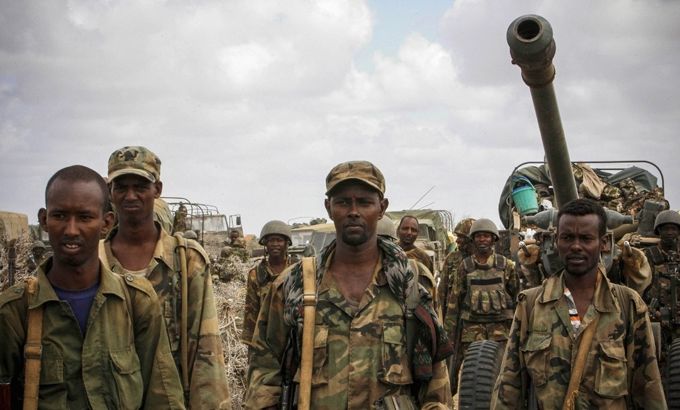Rights group criticises Somalia over rapes
President acknowledges rights issues but denies allegations his soldiers have been abusing people in refugee camps.

Somalia’s President has responded to a report that accuses security forces of abusing people in refugee camps, saying his government is working to improve its human rights record but that the list of problems his country is facing is “endless”.
Human Rights Watch (HRW) said on Tuesday that Somalia’s state security forces and armed groups have raped and beaten people who sought shelter and safety in emergency camps.
Keep reading
list of 4 itemsEurope pledges to boost aid to Sudan on unwelcome war anniversary
Birth, death, escape: Three women’s struggle through Sudan’s war
Mapping Israel-Lebanon cross-border attacks
The New York-based rights group said the victims were people arriving in the capital, Mogadishu, after fleeing famine and armed conflict since 2011.
In an 80-page report, the HRW said the new Somali government had done little to change the situation.
‘Longstanding problem’
President Hassan Sheikh Mohamud told Al Jazeera that the human rights abuses have been a longstanding problem in the East African country but that men in fake uniforms may have been responsible for some of the rapes.
“Violations have happened in the past 20 years. We have been working to address the challenge of human rights without a government in place in Somalia. But now that we do have a government, we are committed to address this issue,” Sheikh Mohamud said.
|
“Violations have happened in the past 20 years. We have been working to address the challenge of human rights without a government in place in Somalia. But now that we do have a government, we are committed to address this issue.“ – President Hassan Sheikh Mohamud |
“A report has been prepared before I came to office in 2011 and 2012 and we do not deny that there are shortcomings. The list of problems in Somalia is endless. The human rights issue is part of that list,” the president added.
HRW called on the Somali government to urgently improve the protection and security of Mogadishu’s internally displaced population.
The report details serious violations, including physical attacks, restrictions on movement and access to food and shelter.
It also highlights clan-based discrimination against the displaced in the capital from the height of the famine in mid-2011 through 2012.
Leslie Lefkow, HRW’s deputy Africa director, said displaced people had been subjected to hostility and abuse instead of being granted a safe haven.
‘Protection of displaced’
“The new Somali government should quickly remedy the failures of the previous government, improve protection of displaced people, and hold to account members of the armed forces and others responsible for abuses,” she said.
HRW’s report said interviews with 70 displaced people documented the ways in which government forces, affiliated militias, and private parties, notably camp managers known as “gatekeepers”, preyed upon the vulnerable community.
David Mepham, HRW’s UK director, told Al Jazeera that his organisation is calling for “a real process of accountability” for the alleged abuses.
“Lots of abuses have been committed in these camps, sometimes with the knowledge of the gatekeepers, but noone has been held accountable for that,” he said.
Somalia is slowly emerging from two decades of conflict, which began with the overthrow Siad Barre’s government in 1991.
In 2011 a combination of fighting involving Somalia’s Transitional Federal Government and African peacekeepers against al-Shabab armed group and unrelenting drought caused a devastating famine.
Tens of thousands of people fled south-central Somalia for Mogadishu where many are living in camps.